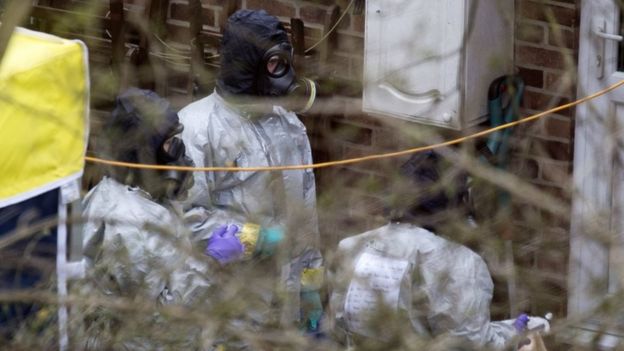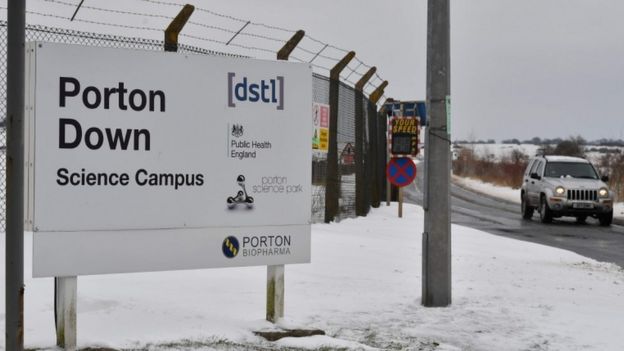
Russia's call for a joint inquiry into the poisoning of an ex-spy and his daughter in England is "perverse", the UK has told the international chemical weapons watchdog in the Hague.
The victim of an attack is not required to work with the "likely perpetrator", UK acting representative John Foggo told the OPCW's executive council.
Russia called the meeting to challenge the UK, which has blamed Moscow for the March 4 poisoning.
It has strongly denied any involvement.
The British government says a military-grade Novichok nerve agent of a type developed by Russia was used in the attack on Sergei Skripal and his daughter Yulia in Salisbury, southern England.
The incident has caused a major diplomatic fallout, with the expulsion of some 150 Russian diplomats by the UK and its allies being met by counter-expulsions by Moscow.
On Tuesday the UK's Porton Down laboratory said it could not verify the precise source of the Novichok nerve agent used in Salisbury, although it did say it was likely to have been deployed by a "state actor".
The comments were seized upon by Russia to discredit the UK's accusations.
But in the Hague, Mr Foggo told the emergency OPCW meeting that the UK believed it was highly likely Russia was responsible for the nerve agent attack based on:
He said that Russia had offered more than 24 "contradictory and changing counter-narratives" about the attack.
The EU delegation offered its full support to Britain, saying Russia had unleashed "a flood of insinuations targeting its member states" in the aftermath of the poisoning.
Russia's President Putin, speaking in the Turkish capital Ankara, said he hoped "common sense" would prevail.
Russia called the meeting because, among other things, it wants to know what kind of evidence the UK has provided to the OPCW - the Organisation for the Prohibition of Chemical Weapons; which inspectors visited the site of the attack in Salisbury, who they met and where the samples are being analysed.

A team believed to be from the OPCW carry out tests in Salisbury
Diplomats at the OPCW said the Russian proposal for a joint inquiry - seen by Western powers as an attempt to undermine the OPCW's existing investigation - was unlikely to be approved by the 41-nation executive council with the two-thirds majority required.
The OPCW expects to receive the results of its own independent laboratory tests within a week.
It does not have the power to attribute blame, but it could ask the Kremlin to grant its inspectors access to former Soviet Union production facilities to check all of their chemical weapons stockpiles have been destroyed.
The EU has said it is very concerned that Russia might reject the results of the investigation.
Earlier, Russian foreign intelligence chief Sergei Naryshkin said in Moscow that the poisoning was a "grotesque provocation... that was crudely concocted by the British and American security services" to implicate Russia.
"It is appropriate to say that the dark times of the Cold War are back," he said.
Analysis by the BBC's David Shukman
The only way that scientists can be totally sure who made the Novichok agent is to compare it with another sample of the substance made in the same lab. That's what happened when Sarin was used by Saddam Hussein in Iraq and more recently by President Assad in Syria.
Experts already knew which clues to look for, and that allowed them to lay the blame definitively. Novichok is much less well known. The traces of it gathered in Salisbury will have been put through detailed scientific screening and that would reveal the ingredients of the chemical and maybe also its basic structure.
That could be matched with whatever is known about Novichok, maybe from lab notes handed over by defectors. And for Porton Down to describe it as "military grade" suggests a sophisticated state producer, not an amateur, though that itself is not categorical proof of Russian involvement.
That leaves another scenario in this secretive world of smoke and mirrors - that Britain did already have a sample of Novichok and was able to compare it to the agent used on the Skripals but does not want to reveal the fact, to protect a valuable source of intelligence.
Questions arose about whether the UK had been too quick to point the finger at Russia after the Porton Down laboratory said that it could not verify the precise source of the Novichok nerve agent.

Porton Down dismissed Russian claims the nerve agent might have come from the laboratory
The laboratory, which had previously identified the Novichok nerve agent, said it was likely to have been deployed by a "state actor" but said it was not its job to say where it was manufactured.
Porton Down's chief executive Gary Aitkenhead dismissed Russian claims it might have come from the UK military laboratory.
On Twitter, the Russian Embassy highlighted a now-deleted tweet by the UK Foreign Office which suggested Porton Down had said the nerve agent had been produced in Russia.
The Foreign Office said the tweet had been part of a real-time account of a speech by the UK's ambassador in Moscow and was deleted because it "did not accurately report our Ambassador's words".
It added: "None of this changes the fact that it is our assessment that Russia was responsible for this brazen and reckless act and, as the international community agrees, there is no other plausible explanation."
On Wednesday, International Trade Secretary Liam Fox said Britain knew that Russia had been stockpiling the nerve agent and that it had been investigating ways to deliver it.
The BBC understands Miss Skripal, 33, is now conscious and talking. Salisbury District Hospital has said her father, 66, remains critically ill but stable.
Mr Aitkenhead said he had been advising those treating the Skripals.
"Unfortunately this is an extremely toxic substance. There is not, as far as we know, any antidote that you can use to negate the effects of it," he added.